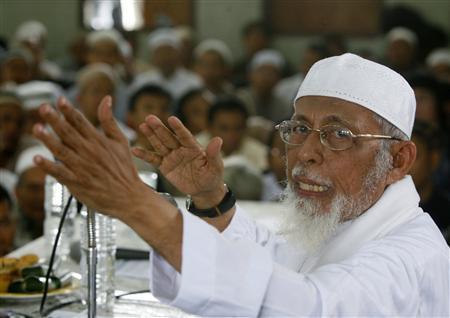Indonesian hardline cleric calls for jihad in GazaSun Jan 18, 2009 4:26am
JAKARTA (Reuters) -
One of Indonesia's best-known radical clerics on Sunday urged Muslims from the world's fourth most populous Muslim country to fight in the Gaza Strip following Israeli attacks which have killed more than 1,200 Palestinians.
Abu Bakar Bashir, who was alleged to have once headed the Southeast Asian militant network, Jemaah Islamiah (JI), preached to about 500 people at a mosque in Bekasi, east of Jakarta, urging them to join a jihad in the Gaza Strip.
"The war in Palestine isn't a war between one country and another, it is a religious war. The Jews try to destroy Islam, and so Muslims must join, to fight in their own capacity," he said.
"Their suffering is our suffering, their blood is our blood, their trouble is our trouble. Thus, we must defend and protect them."
President Susilo Bambang Yudhoyono has urged Israel to put an end to the three weeks of violence, and has sent humanitarian aid for the victims in Palestine.
The government has tried to discourage calls from more militant groups to send civilian fighters, and has offered to dispatch a peacekeeping mission to the Gaza Strip.
About 85 percent of the population of 226 million people are Muslim, and most are moderate. The attacks on Gaza have prompted several big rallies protesting against Israel.
"We have sent material aid and, of course, our prayers. Jihad is not yet possible because the access remains closed. Nonetheless, we are preparing ourselves as it is our obligation," Bashir said.
Bashir was imprisoned for conspiracy over the 2002 bomb attacks in the resort island of Bali, in which more than 200 people died. He was later cleared of wrongdoing.
Since his release from prison in June 2006, the controversial cleric has traveled around the country preaching about the importance of sharia, or Islamic law.
Abu Bilal, one of the 50 would-be fighters who attended Bashir's sermon, said he was ready "to fulfil God's calling" and fight those trying to oppress Muslims.
(Reporting by Karima Anjani; Editing by Sara Webb and Bill Tarrant)

Thomson Reuters 2009 All rights reserved
